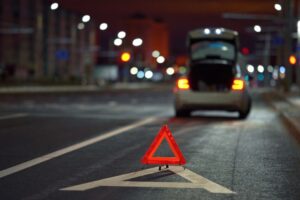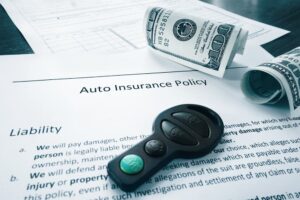If you've been rear-ended, you may be dealing with serious injuries caused by the negligence and recklessness of the other driver. Rear-end collisions are one of the most common types of car accidents. Even at relatively low speeds, the force of impact can cause significant trauma. Always get proper medical care for your injuries and schedule a consultation to understand your legal rights. An experienced car accident lawyer can evaluate your case, deal with the insurance companies on your behalf, and fight to get you the full and fair compensation you deserve.
Common Rear-End Collision Injuries
While any part of the body can potentially suffer injury in a rear-end crash, certain injuries tend to be more common.Whiplash and Neck Injuries
Whiplash is the quintessential rear-end collision injury. It occurs when the head and neck are suddenly and forcefully whipped forward and then backward, stretching the muscles, ligaments, and tendons beyond their normal range of motion. Symptoms of whiplash include neck pain and stiffness, headaches, dizziness, blurred vision, and arm pain or numbness. These symptoms may appear right away or have a delayed onset. More severe neck trauma from a rear-end accident can include:- Cervical spine fractures
- Herniated or ruptured discs in the cervical vertebrae
- Neck sprains and strains
- Vocal cord paralysis from laryngeal nerve damage
Back Injuries
The extreme forces in a rear-end crash can cause the spine to compress, twist, and bend unnaturally. This can damage the vertebrae, discs, nerves, ligaments, and muscles at any point along the spinal column. Common back injuries include:- Thoracic spine injuries to the upper back and rib cage
- Lumbar spine injuries to the lower back
- Herniated, slipped, or ruptured discs
- Spinal cord damage
- Sprains and strains
- Fractured vertebrae
Head and Brain Injuries
Striking the steering wheel, dashboard, window, or headrest in a rear-end collision can cause traumatic brain injuries (TBI). Even if there is no direct blow to the head, the rapid acceleration-deceleration motion can cause the brain to strike the inside of the skull. Head and brain injuries may include:- Concussions
- Skull fractures
- Intracranial hemorrhage (bleeding in the brain)
- Diffuse axonal injury from shearing/tearing of brain tissue
- Facial lacerations, fractures, dental injuries and disfigurement
- Ear injury and hearing loss
- Eye socket fractures and vision loss
Shoulder and Arm Injuries
Shoulder and arm injuries are common when a person tenses up and grips the steering wheel tightly in anticipation of a rear-end collision. The impact can cause the shoulder to absorb significant force. Injuries may include:- Torn rotator cuff
- Dislocated shoulder
- Brachial plexus injuries (damage to nerves controlling arm/hand)
- Broken collarbone
- Humerus (upper arm bone) fracture
- Wrist and hand fractures
- Sprains/strains
Chest Injuries
The chest area can strike the steering wheel in a rear-impact crash, and the sudden force can cause damage to the chest wall, ribs, and internal organs. Seat belt restraints can also cause chest injuries in high-impact crashes. Common chest injuries include:- Broken ribs
- Damage to organs like lungs, heart, liver, spleen
- Internal bleeding
- Flail chest (disconnected segment of ribs)
- Cardiac and pulmonary contusions
- Fractured sternum
- Seat belt syndrome (tears in the abdominal wall)
Leg and Knee Injuries
The legs and knees can strike the dashboard or seats in front of them or become twisted, fractured, or crushed. Potential leg/knee injuries:- Dashboard knee - ligament/tendon damage in the knee
- Torn meniscus
- Fractured patella (kneecap)
- Dislocated knee
- Femur (thighbone), tibia/fibula (lower leg) fractures
- Torn or sprained ACL, MCL, or PCL ligaments
- Achilles tendon rupture
- Ankle fracture or sprain
- Foot and toe fractures
Psychological and Emotional Injuries
Not all rear-end collision injuries are physical. Many victims suffer mental and emotional trauma, such as:- Depression
- Anxiety and panic attacks
- Phobias about driving/riding in cars
- Mood swings
- Sleep disorders
- Cognitive issues with memory, concentration, etc.
Seeking Prompt Medical Treatment
 It's wise to get medical care immediately after a rear-end accident, even if you think your injuries are minor. Some serious injuries may have delayed symptoms that get progressively worse. Promptly diagnosing and documenting your injuries is also important for protecting your legal rights.
Go to the emergency room or see your doctor right away if you experience any:
It's wise to get medical care immediately after a rear-end accident, even if you think your injuries are minor. Some serious injuries may have delayed symptoms that get progressively worse. Promptly diagnosing and documenting your injuries is also important for protecting your legal rights.
Go to the emergency room or see your doctor right away if you experience any:
- Neck or back pain
- Numbness, tingling, or weakness in your limbs
- Headache or dizziness
- Memory loss or disorientation
- Abdominal pain
- Shortness of breath
- Behavioral or mood changes
What Your Lawyer Will Seek Compensation For
A car accident lawyer will evaluate the full extent of the damages you suffered due to the rear-end crash, which may include:Medical Expenses: Past and Future
After a rear-end car accident, you may face a mountain of medical bills for the treatment of your injuries. This can include costs for ambulance rides, emergency room visits, hospital stays, surgeries, doctor appointments, prescription medications, medical devices, and more. Depending on the severity of your injuries, you may need ongoing care such as physical therapy, occupational therapy, chiropractic care, pain management, mental health counseling, and other rehabilitation services. Your car accident lawyer will seek compensation for all accident-related medical expenses you've already incurred, as well as the estimated costs of future treatment you'll need going forward. This may require testimony from medical experts who can speak to your prognosis and long-term care needs. Don't get stuck paying these bills out of your own pocket when someone else caused your injuries.Lost Income
Recovering from rear-end collision injuries often means missing days, weeks, or even months of work. You may be unable to perform your job duties during this time, resulting in lost income. This can be a huge financial hardship for you and your family, especially when you're already dealing with unexpected medical expenses. Your car accident lawyer will fight to recover compensation for all your lost earnings due to missed work after the crash. This includes wages, tips, bonuses, commissions, self-employment income, and other forms of compensation you should have received had you been working. Your lawyer will gather evidence like past pay stubs, tax returns, and employer statements to document your lost income claim.Reduced Future Earning Capacity
Some rear-end accident injuries may have permanent effects that impact your ability to work and earn a living long after the crash. For example, chronic pain, physical limitations, cognitive impairments, psychological trauma, or visible scars/disfigurement can affect your job performance and employment opportunities. You may have to work reduced hours, switch to a lower-paying position, or even change careers altogether. If your earning potential decreased due to the lasting consequences of your injuries, you deserve compensation for that loss. Your car accident attorney will work with vocational experts and economists to calculate the value of your reduced earning capacity over the course of your lifetime. This may include the difference in income between your old and new jobs, loss of promotion opportunities, and costs for vocational rehabilitation or retraining.Vehicle Repair and Replacement Costs
 In addition to injuring people, rear-end collisions often cause significant damage to vehicles. You may be facing costly repairs to fix issues like cracked bumpers, crushed fenders, broken taillights, and alignment problems. In some cases, the damage may be so extensive that replacing the vehicle entirely is more economical, especially if it's an older model.
Your car accident lawyer will seek reimbursement for all reasonable and necessary vehicle repair costs stemming from the rear-end crash. If your vehicle is declared a "total loss," your lawyer will fight to get you compensated for the fair market value of your vehicle so you can replace it. You shouldn't have to deal with the hassle and expense of fixing or replacing your car because of someone else's negligence
In addition to injuring people, rear-end collisions often cause significant damage to vehicles. You may be facing costly repairs to fix issues like cracked bumpers, crushed fenders, broken taillights, and alignment problems. In some cases, the damage may be so extensive that replacing the vehicle entirely is more economical, especially if it's an older model.
Your car accident lawyer will seek reimbursement for all reasonable and necessary vehicle repair costs stemming from the rear-end crash. If your vehicle is declared a "total loss," your lawyer will fight to get you compensated for the fair market value of your vehicle so you can replace it. You shouldn't have to deal with the hassle and expense of fixing or replacing your car because of someone else's negligence
Pain, Suffering, and Emotional Distress
Not all rear-end accident injuries are visible or easily quantifiable. Many people experience significant physical pain and suffering, mental anguish, and emotional distress from their ordeal. This can include things like chronic pain, headaches, sleep disturbances, flashbacks, anxiety, depression, mood swings, irritability, loss of appetite, and post-traumatic stress disorder (PTSD). While no amount of money can truly make up for these intangible losses, the law allows accident victims to seek financial compensation for pain and suffering damages. These non-economic damages aim to provide some measure of justice and acknowledgment of your reduced quality of life. Your car accident lawyer will use their experience handling similar cases to assign an appropriate dollar value to your pain and suffering claim.Loss of Enjoyment of Life
Getting hurt in a rear-end collision can rob you of the ability to participate in activities and hobbies you once enjoyed. You may miss out on important milestones and experiences with family and friends. Everyday tasks like cooking, cleaning, driving, and self-care may become painful or impossible. Intimate relationships with partners may suffer. If your injuries have significantly impacted your ability to enjoy life the way you did before the crash, you may be entitled to compensation for "loss of enjoyment" damages. Your car accident lawyer will gather evidence demonstrating how your lifestyle and capabilities have changed, such as journal entries, witness statements from loved ones, and expert opinions from medical and mental health professionals. While these losses are difficult to put a price tag on, your lawyer will fight to get you properly compensated.Disability and Disfigurement
Some rear-end accident injuries are so severe that they result in permanent disability or disfigurement. This may include paralysis, amputation, traumatic brain injury, burns, or significant scarring. These catastrophic injuries can completely alter the course of your life, affecting your independence, relationships, career, and sense of self. You may need lifelong medical care, assistance with daily living tasks, home modifications for accessibility, and other costly accommodations. If you've been disabled or disfigured due to a rear-end crash, your car accident lawyer will aggressively pursue maximum compensation for all the effects on your life. This may include money for long-term care costs, adaptive equipment, loss of consortium with your spouse, emotional distress, and other damages. While no settlement or verdict can undo the harm you've suffered, it can provide crucial financial support and a sense of accountability.Out-of-Pocket Expenses
Rear-end accident injuries can lead to numerous expenses beyond just medical bills and vehicle repairs. You may have out-of-pocket costs for things like transportation to doctor's appointments, over-the-counter medications, medical equipment like crutches or braces, and replacement services for tasks you can no longer perform, like housekeeping, yardwork, or childcare. These expenses can quickly add up and strain your budget, but you shouldn't have to pay for them when someone else's negligence caused your injuries. Your car accident lawyer will carefully document all the out-of-pocket costs you've incurred due to the rear-end crash and include them in your overall claim for damages. Keep track of your receipts and other proof of payment so your lawyer can seek reimbursement on your behalf. Your lawyer may also pursue punitive damages if the at-fault driver's actions were particularly egregious or intentional, such as drunk driving or road rage. Rather than compensating you for specific losses, punitive damages punish the wrongdoer and deter similar misconduct.Proving Liability in a Rear-End Collision Case
 Rear-end collisions are generally the fault of the following driver for failing to maintain a safe distance and stop in time. All drivers have a duty to pay attention to the road and not follow too closely. This is called negligence.
However, there may be multiple contributing factors in a rear-end crash, such as:
Rear-end collisions are generally the fault of the following driver for failing to maintain a safe distance and stop in time. All drivers have a duty to pay attention to the road and not follow too closely. This is called negligence.
However, there may be multiple contributing factors in a rear-end crash, such as:
- Speeding or reckless driving
- Distracted driving (texting, eating, grooming, etc.)
- Driving under the influence of alcohol/drugs
- Fatigued/drowsy driving
- Defective brakes or other vehicle equipment
- Poor weather or road conditions
- Police accident reports
- Photos/video of the crash scene and vehicle damage
- Footage from traffic cameras or dashcams
- Cell phone records
- Witness statements
- Vehicle repair and maintenance history
- Driver toxicology reports
- Accident reconstruction analysis
